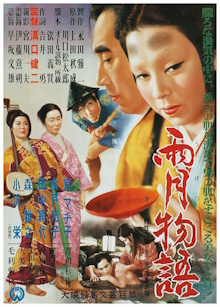Adapted from supernatural stories dating back to the 18th century, this period fantasy film is utterly traditional. It’s been a while since we’ve watched anything as old-fashioned as this and it’s satisfying how we now interpret these old stories differently in light of all that we’ve learned about art and cinema. This film is delightful and the execution is perfect, as it successfully evokes the supernatural with no special effects. More than that, it strikes me now that these stories were written to keep the peasants in their place and never attempt to rise above their station. It’s so obvious that I wondered why I never saw it before.
A village on the shore of Lake Biwa is threatened by Shibata Katsuie during the Sengoku Period but Genjūrō, a potter, takes the opportunity to go sell his products in a neighboring town. Meanwhile another villager Tōbei dreams of becoming a samurai and goes along with him. They do indeed return with money and Genjūrō’s wife Miyagi begs him to be content with it. But he insists on finishing another batch of pottery to sell. That night the soldiers sweep through the village, forcing them to flee into the hills. Despite the danger, Genjūrō sneaks back and is delighted to find that his pots have finished baking. In the end, Miyagi is left behind with her son Genichi at the village, while Genjūrō, Tōbei and Tōbei’s wife Ohama goes to the town marketplace. The pots sell well and Tōbei runs away from his wife to buy weapons and armor to be a samurai. Left alone, Ohama is raped by soldiers. Genjūrō encounters a noblewoman Lady Wakasa and her servant who wants to buy many of his pots and insists that he deliver them to her manor. But it becomes increasingly obvious that they are actually ghosts.
This film is structurally clunky and that may be because it’s really two stories in one. Tōbei’s storyline seems to have been inspired by a 19th-century French short story instead of being drawn from the Ugetsu Monogatari. When Genjūrō, Tōbei and Ohama all separate from each other in town, none of them are at all concerned, and so the two stories don’t intertwine at all. That said, the film is so artfully crafted that you shouldn’t actually notice while watching. The cinematography, performances and sets are all perfect. At heart, this is the kind of folklore story that everyone is already familiar with, yet it’s still so satisfying to watch it play out on screen with such high production standards. It successfully uses lighting and music to evoke the supernatural, doesn’t shy away from violence and even includes a tastefully done sex scene. In this instance, it’s a real shame that this isn’t in color because the kimonos and such are obviously meant to have very vibrant colors.
Stories like these are like Aesop’s Fables, intended to convey simple, straightforward morals. Some claim that it’s an anti-war statement after World War 2 but that seems superficial to me. What’s striking to me is what the two men Genjūrō and Tōbei have in common. Both are unhappy with their lot in life and dream of being more and having more. Genjūrō does take more risk in the middle of a war to make money, yet his downfall stems from a supernatural encounter that has nothing to do with the war at all. Tōbei’s dream of becoming a famous samurai is insane, yet against all odds he actually manages to succeed. Even so, he finds that the glory isn’t worth it as he has forsaken his own wife to achieve it. The lesson seems to be that mere peasants should be grateful for what they already have and know their place. Dare to dream beyond your station in life and the universe itself will contrive to punish you. It makes sense that these folk tales would seek to enforce the existing social order but I never thought of them in this way before.
I really did enjoy this film even though I feel that I’m wiser now to the type of message they’re intended to teach. It’s so interesting to see in here the same basic building blocks of similar stories we’ve all heard as children and see a deeper meaning in them. The fantastic execution goes a long way in crystalizing its message so even if I dislike what it has to say, I can agree that it says it so very well.
